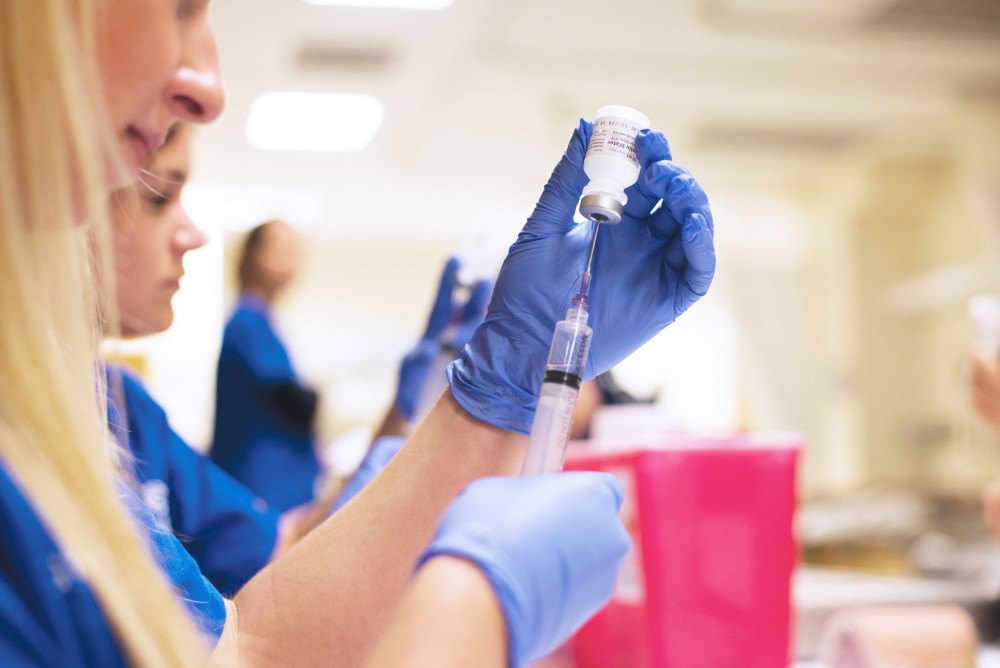GV promotes vaccinations without requirements amid national conversations

Megan Buchman practices giving a shot to a test dummy in the Center for Health Sciences building downtown on Monday, Sept. 26, 2016. GVL / Archive
Feb 18, 2019
With an anti-vaccination movement on the rise, the possession of accurate information on vaccines is becoming increasingly in demand across college campuses.
The student senate’s Student Health and Wellness Taskforce reported that while Grand Valley State University’s vaccination rates have had an increase since 2014, they still fall below the national average.
The report comes from the National College Health Assessment survey results. The survey also reported that some specific vaccinations, such as GVSU’s flu and meningitis student immunization rates, have slightly improved from 2014-2018. What does this mean for GVSU?
Director of Simulation at the Cook DeVos Center for Health Sciences Katie Branch said that while other states require immunizations to be reported in post-secondary education, Michigan does not. She believes this to be one the possible reasons as to why GVSU’s vaccination rates reportedly fall below national level.
It is not uncommon for universities to not require vaccinations. A benchmark survey taken in 2015 reported that of 12 surveyed universities in Michigan, none required immunizations.
“Only some academic programs at GVSU require vaccinations based on clinical site requirements, primarily within the College of Health Professions,” said Amy Campbell, who helps run the Student Health and Wellness Taskforce.
Branch explained that these clinical site requirements come from the U.S. Centers for Disease Control and Prevention (CDC).
While GVSU does not require vaccinations, they do encourage them. Within the past few years, GVSU has concerned itself with a multitude of measures to counteract the low vaccination rates.
“In 2016, a group from our Wellness Taskforce, along with university experts, developed a list of recommended vaccines for students and was shared with both students and parents during orientation,” Campbell said.
GVSU’s recommended vaccines include: influenza, MMR, meningitis, meningitis B, tetanus, diphtheria and pertussis, varicella, hepatitis A, hepatitis B, HPV, pneumococcal and polio.
“(GVSU’s) immunization recommendations for students are based on the American College Health Association’s (ACHA) guideline for immunizations for college students,” Branch said. “The ACHA guidelines follow the Advisory Committee on Immunization Practice’s recommendations published by the Centers for Disease Control and Prevention.”
GVSU is being proactive in the encouragement of student immunizations by having the Student Health Center in Allendale and the Grand Valley Family Health Center in Grand Rapids offer vaccinations.
“The Grand Valley Family Health Center also provides outreach vaccination clinics for students on GVSU campuses throughout the year,” Branch said.
Branch and Campbell expressed the importance of both vaccinations themselves and informing students and parents on the recommended vaccines.
“(Vaccinations) protect not only the individual, but the entire community by reducing the spread of infectious agents to those who have not been vaccinated or those who cannot be protected by vaccines,” Branch said. “For example, individuals allergic to vaccine components or those suffering from illnesses that weaken the immune system, such as cancer.”
Moving forward with encouraging immunizations, Branch stated that GVSU will promote vaccinations without requiring them.
“The GVSU community, including the Student Health and Wellness Taskforce, should and will continue to work collaboratively across campus colleges and service units to expand upon opportunities to inform and remind students and their parents about the importance of immunizations,” Branch said.





















